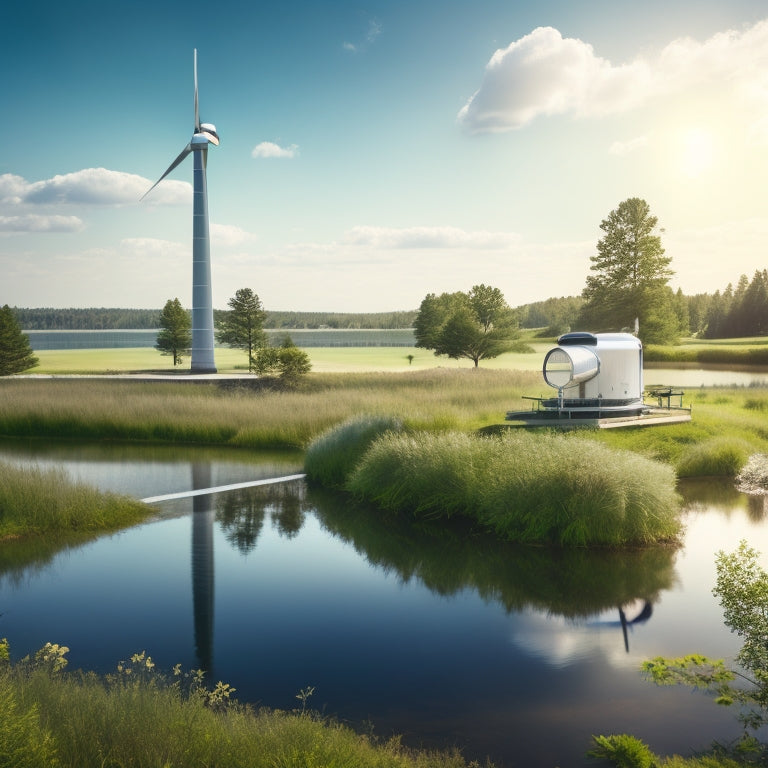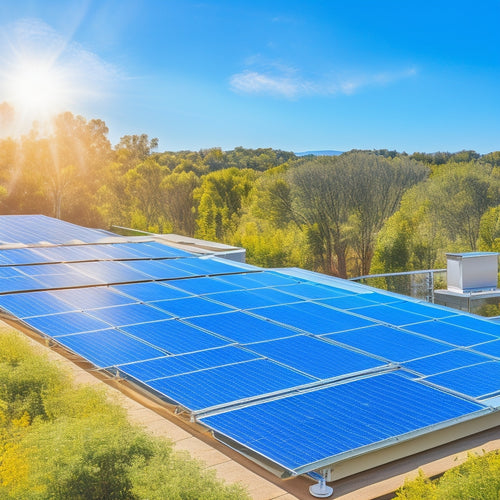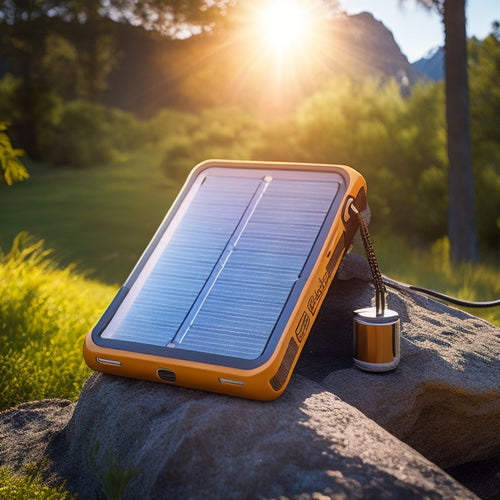
5 Ways to Heat Water With Renewable Energy
Share
You can heat water with renewable energy in five ways: utilizing solar power with solar thermal systems or passive heating, tapping into geothermal energy with heat pumps or hybrid systems, utilizing wind power to generate electricity for heat pumps or electric water heaters, burning renewable biomass fuels like pellets or biodiesel, and leveraging hydro energy with hydroelectric power plants or micro-hydro systems. Each method offers a unique path to energy independence and reduced greenhouse gas emissions. By exploring these alternatives, you're taking an important step towards a more sustainable future - and there's more to uncover about how to make it a reality.
Overview
- Solar thermal systems heat water directly using solar panels, providing energy independence and reduced greenhouse gas emissions.
- Geothermal heat pumps absorb heat from underground, offering a highly efficient and reliable water heating solution.
- Wind power water heating systems generate electricity to power heat pumps or electric water heaters, reducing reliance on non-renewable energy.
- Biomass systems burn organic matter to produce hot water, providing a clean and efficient alternative to traditional heating methods.
- Hydro energy harnesses the power of water to generate electricity for heating, with micro-hydro systems achieving efficiencies of 50-60%.
Harnessing Solar Power for Heating
Your search for an eco-friendly way to heat water ends with solar power, a renewable energy source that's both sustainable and cost-effective. By utilizing the sun's energy, you can reduce your reliance on fossil fuels and lower your energy bills.
Solar thermal systems use solar panels to heat water directly, while passive heating systems absorb heat from the sun through building materials. With the benefits of solar energy, including energy independence and reduced greenhouse gas emissions, you can enjoy a clean, free, and virtually limitless energy source.
You can install solar thermal panels on your roof to heat water for your home, or integrate passive heating into your building design. By switching to solar, you'll not only reduce your carbon footprint but also gain independence from the grid.
Geothermal Energy for Water Heating
Nearly 90% of the Earth's energy lies beneath its surface, making geothermal energy a viable alternative for heating water. You can tap into this natural heat source using geothermal heat pumps, which work by circulating fluid through underground pipes to absorb heat from the Earth. This heat is then transferred to your water supply, providing a reliable and efficient way to heat water.
In fact, Energy Efficient Smart Thermostats can also be integrated with geothermal systems to optimize energy usage and reduce peak energy consumption. Additionally, geothermal energy can be used in conjunction with other renewable energy sources, such as solar power, to provide a hybrid heating system.
Geothermal district heating takes this concept a step further, supplying entire neighborhoods with hot water through a network of underground pipes. By utilizing geothermal energy, you can reduce your reliance on fossil fuels and enjoy a consistent, renewable heat source for your water needs.
Wind Power Water Heating Systems
Wind turbines can be employed to generate electricity, which in turn powers heat pumps or electric water heaters, providing a clean and renewable source of energy for water heating. You can take advantage of wind power to heat water in your home or off-grid systems, reducing your reliance on non-renewable energy sources. The efficiency of wind turbines plays a vital role in determining the effectiveness of wind power water heating systems.
| System Component | Description |
|---|---|
| Wind Turbine | Generates electricity from wind energy |
| Inverter | Converts DC power to AC for use in homes |
| Heat Pump | Uses electricity to heat water efficiently |
| Electric Water Heater | Alternative option for heating water directly |
| Charge Controller | Regulates power flow to off-grid systems |
Biomass Water Heating Solutions
As you investigate alternative energy sources for water heating, biomass emerges as a promising solution. Biomass water heating solutions offer a clean and efficient way to heat water using organic matter.
By adopting renewable energy sources, farmers can reduce their reliance on external power providers and enhance operational resilience through self-sufficient energy management Energy Independence for Farmers.
You can install pellet stoves or biodiesel boilers that burn wood chips or other renewable fuels to produce heat. Biogas systems, which convert organic waste into fuel, can also be used to heat water. Biomass furnaces provide another option, burning organic materials to produce hot water.
With biomass water heating solutions, you'll reduce your reliance on fossil fuels and lower your carbon footprint. By utilizing the energy potential of biomass, you'll enjoy a sustainable and environmentally friendly way to heat your water.
Hydro Energy Water Heating Options
Two thirds of the Earth's surface is covered in water, making hydro energy a vast and largely untapped resource for heating water. You can utilize this energy using hydroelectric power plants or smaller-scale systems, such as water turbines, to generate electricity and heat water.
| System Type | Hydropower Efficiency | Water Turbine Size |
| Micro-hydro | 50-60% | 1-10 kW |
| Small hydro | 60-70% | 10-100 kW |
| Large hydro | 80-90% | 100-1000 kW |
These systems can be highly efficient, with some large hydroelectric power plants achieving hydropower efficiencies of up to 90%. By leveraging hydro energy, you can reduce your reliance on fossil fuels and lower your carbon footprint.
Frequently Asked Questions
Can I Use Renewable Energy for Industrial-Scale Water Heating Needs?
You can definitely use renewable energy for industrial-scale water heating needs; consider solar thermal systems, biomass boilers, or geothermal heat to increase energy efficiency, reducing your reliance on fossil fuels and enhancing your freedom from energy dependence.
How Much Does It Cost to Install a Renewable Water Heating System?
You're considering installing a renewable water heating system, like the one at the Oregon State Hospital, which saved $100,000 annually. Your initial investment will be around $500,000, but you'll reap long-term savings of up to 70% on energy costs, achieving energy freedom.
Are Renewable Water Heating Systems Eligible for Government Incentives?
You'll be pleased to know that you're eligible for government incentives, such as tax credits and financing options, if you meet the eligibility criteria for renewable water heating systems, which vary by program, so research local and national incentive programs to maximize your savings.
Can I Combine Multiple Renewable Energy Sources for Water Heating?
As you traverse the labyrinth of sustainable living, you're not limited to a single path; you can combine solar thermal, hybrid systems, and geothermal integration with energy storage, unblocking a powerful collaboration that frees you from fossil fuels.
Do Renewable Water Heating Systems Require More Maintenance Than Traditional Systems?
You'll find that renewable water heating systems often require similar maintenance frequency to traditional systems, but their system longevity and energy efficiency can offset costs, thanks to technology advancements and positive user experiences, making them a cost-competitive choice.
Ready to Buy
You've investigated the various ways to heat water with renewable energy, from utilizing solar power to leveraging hydro energy. Now, imagine a rural village in Africa where a wind-powered water heating system provides hot water for a community of 500 people, reducing their reliance on fossil fuels and carbon emissions. This real-world example demonstrates the potential of renewable energy to change water heating, making it a cleaner, more sustainable process for everyone.
Related Posts
-

Solid State Batteries in Electric Vehicles
Solid-state batteries revolutionize electric vehicles by offering a longer lifespan and higher energy density than tr...
-

What Types of Solar Energy Devices Are Available
You'll find several types of solar energy devices available today, each customized to different energy needs. Photovo...
-

Fastest Solar Chargers for Emergency Power
When choosing the fastest solar chargers for emergency power, you need to focus on features like rapid charging capab...


